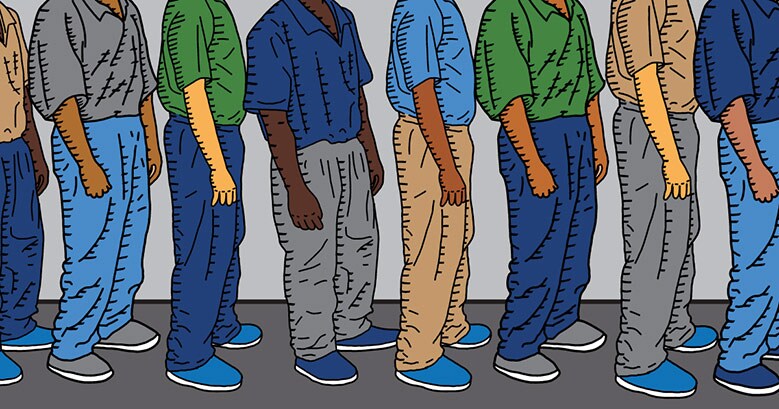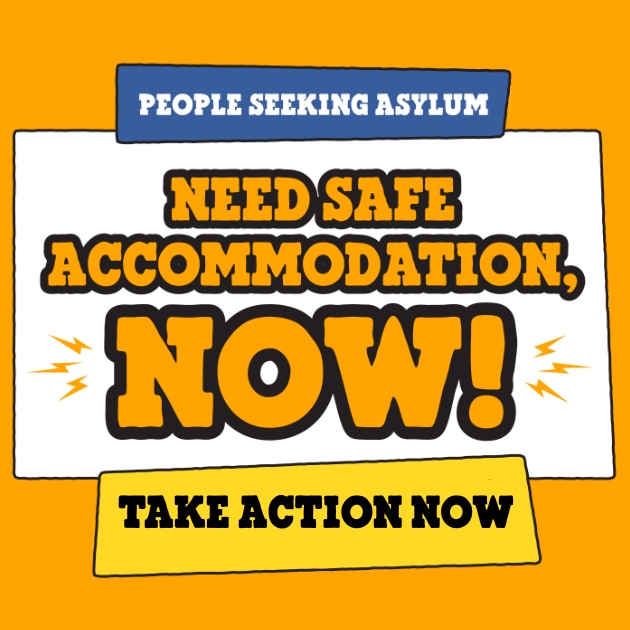
We sometimes think of immigration detention as the UK’s best kept, awful secret.
But it’s a confusing subject, especially because what the government says it’s used for is so far from reality. So, what is the truth? We have the full scoop
What is Immigration Detention?
According to the Home Office, immigration detention is when they hold people in Immigration Removal Centres (IRCs) to facilitate their deportation. They claim that it is only used as a last resort, implemented immediately before a scheduled deportation. But the reality is that detention is used far beyond its stated purpose. In fact, a report from MPs on the Home Affairs Committee warned there are "serious problems" in almost every part of the detention system.
In the UK, people can be held in immigration detention if they don’t have the right to remain — meaning their application to be in the UK is being processed or has been refused. And while you would think that the decision to detain someone would come from a judge, it shockingly needs no judicial oversight. Only a Home Office official needs to decide to detain someone for them to be ripped from their family with no idea when they might return.
Over half of all people in immigration detention have sought asylum in the UK at some point, meaning they are here seeking safety from war or violence in their home countries. Survivors of torture and victims of human trafficking and modern slavery are also often wrongly detained without adequate safeguards. Others can be detained when they try to renew their visa after living here legally for years. Often people have been here since they were children and consider themselves British.
What Kind of Numbers Are We Talking About?
On average around 24,000 people are detained in the UK each year. There are seven detention centres in the UK, some run by the government and some run by private security companies for a profit.
The UK government holds people in immigration detention centres for periods ranging from days to several years, but they get it wrong so often that more than 60% of people are eventually released. For many, their detention had no impact on their immigration case and was completely unnecessary.
Why Is It So Bad?
We think this system is exploitative, ineffective, and unjust. Here’s the quick scoop on why:
-
1. Lack of judicial oversight
Home Office officials decide who to detain and for how long, without any automatic review or oversight from a judge. This means people can be ripped from their families and communities with no notice and no idea how long they will be gone for without a judge ever seeing their case. In contrast, if someone is suspected of a criminal offence, they can only be held by police for 24 hours without being charged, or for a maximum of 96 hours if approved by a judge
-
2. The government gets it wrong all the time.
Over 60% of people detained end up being released, many of whom were living in the UK legally to begin with. In fact, the UK government gets it wrong so often that they pay out millions in compensations each year — between 2012 and 2017, the UK government paid a hefty £21 million after wrongly detaining 850 people.
-
3. It’s traumatic and dehumanising.
Being held in immigration detention is traumatic for anyone, but particularly so for survivors of torture or victims of human trafficking. Without access to community support and safeguards, there’s an additional risk to their physical and mental health.
-
4. There’s no time limit.
The UK government detains people indefinitely. People in detention can only count the days, never knowing when they may leave the detention centres or see their families again. As the only country without a time limit, we’re way behind our European neighbours on this. This also means there’s no sense of urgency for cases to be resolved by the Home Office.
-
5. Conditions are inhumane and unsanitary.
This is especially relevant during a global pandemic, but isn’t acceptable regardless. In 2018, disgraceful physical and verbal abuse of detainees by staff was revealed at Brook House detention centre, and sadly this isn’t an isolated case.
-
6. There are alternatives!
It doesn’t have to be this way! Remember that the immigration system and the criminal justice system are completely unrelated. No one in detention is there to protect society or as a punishment. Most immigration cases can be successfully resolved with people continuing to live in their communities with their families.
Sweeten Up Your Inbox!
Subscribe now and we'll make sure you get the inside scoop on Ben & Jerry's fun and flavours! It's like dessert for your inbox, and you're going to want seconds.
What Are the Alternatives?
The current system is ineffective and unjust. Most immigration cases can be successfully dealt with in the community — without detention or tearing people away from their families. This is a significantly more humane and effective way of resolving immigration claims and leads to better outcomes for everyone involved.
Our friends at Detention Action have been piloting an alternative to detention with excellent results. Find out more about their Community Support Project and other alternatives here.
What Can I Do?
We’re joining our friends at Detention Action in opposing inhumane immigration detention. Add your voice now.
Recent Articles
Sweeten Up Your Inbox!
Subscribe now and we'll make sure you get the inside scoop on Ben & Jerry's fun and flavours! It's like dessert for your inbox, and you're going to want seconds.


